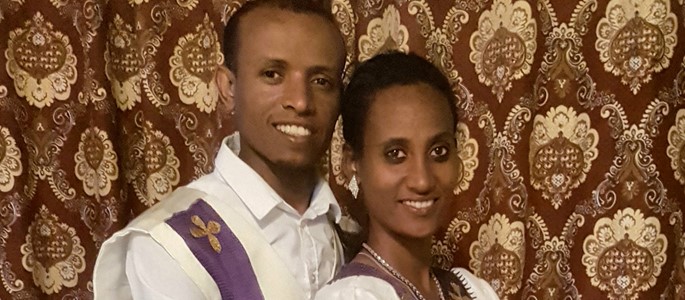Forced to leave his pregnant wife three years ago – was denied family reunification
After escaping forced conscription in Eritrea, Misghinna survived the dangerous journey to Europe. He now speaks Danish and has a job – but without his wife, life is meaningless
INFO:
Marriage certificates from Eritrea are not recognised in Denmark. Eritreans usually only have a certificate form the church, but a civil certificate is also required by the Danish state, which very few Eritreans have ever gotten and which can seldom be acquired after they have left the country. This is due to an interpretation of Eritrean law and practice, which has recently been overruled by a court in Holland. Since 2015, Refugees Welcome has tried to get the Danish practice changed through applications to the Immigration Service and the Immigration Appeals Board, but without success. It is therefore only possible to have your spouse brought here if you had been living together as a couple for at least 18 months. Many have been prevented from this due to military service and prison stays. In 2017, 886 couples from Eritrea applied and only 417 were granted permission = 47%.
Refugees Welcome sent an appeal concerning Misghinna’s rejected application to the Immigration Service in November 2017, together with documentation of the legitimacy of their couple’s relationship, such as photos from their engagement, video from the wedding and daily correspondence via internet, all the way up to the present. In the meantime, Misghinna has been to Ethiopia to visit his wife, who is expecting their second child in October. In Ethiopia, the couple were re-married and acquired an Ethiopian marriage certificate. The Immigration Appeals Board also turned the case down, and a second appeal is till pending.
This is the story of one of the 5,000 Eritreans, now living in Denmark. About why he had to flee, how his journey unfolded, how he has settled here in Denmark, about his strong faith in God – and how none of this means anything if he can’t live together with his family. It was originally written by Birthe Munck-Fairwood for the publication, Nyt på Tværs, from the Intercultural Christian Centre Denmark, and Michala Clante Bendixen has contributed with facts concerning the family reunification case.
UPDATE December 2021: The couple had a healthy daughter in November 2018, but also another rejection from Immigration Board. In collaboration with Refugees Welcome a lawyer has filed a new complaint, but the case will not be decided until April 2022. By then the couple has been separated for more than 6 years.
Every day, Misghinna Melake Gebrezgabher gives thanks for the fact that he is alive. After three months on the run from his homeland Eritrea, through the Sahara Desert to Libya and onwards across the Mediterranean with 650 other refugees, life is never again something you take for granted. The 29 year old biologist and deacon in the Orthodox Church came to Denmark in September 2015 and today lives at a disused farm in Lille Skensved near Køge. However, seven months ago, when his application to have his wife brought to Denmark was rejected, all future plans just froze.
Everything should have gone well. Misghinna speaks fluent Danish, is in full-time employment and will soon take his final exam at language school. Yet last November, his application for family reunification for his wife Selam was rejected. Since then, he’s had a hard time coping with daily life. His thoughts keep returning to 27 year old Selam, who has been living illegally in the neighbouring country of Ethiopia for a year and a half.
“My wife is God’s gift to me. We grew up in the same village and have known each other since childhood. Everything is very difficult for her right now. I’m very worried. We were engaged in December 2013 and married in January 2015. But six months later, I had to flee the country”, tells Misghinna, showing photographs of a young, well-dressed couple celebrating their engagement in the port of Massawa in Eritrea. Back then, the future had seemed bright and full of promise. Misghinna had completed his bachelor degree in biology and worked as a high-school teacher. A video from their wedding day shows happy party-goers, singing and dancing for the bride and groom.
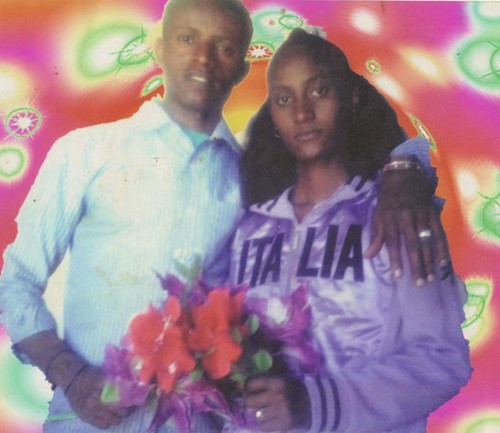
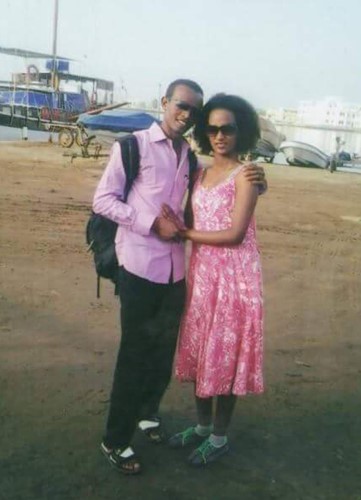
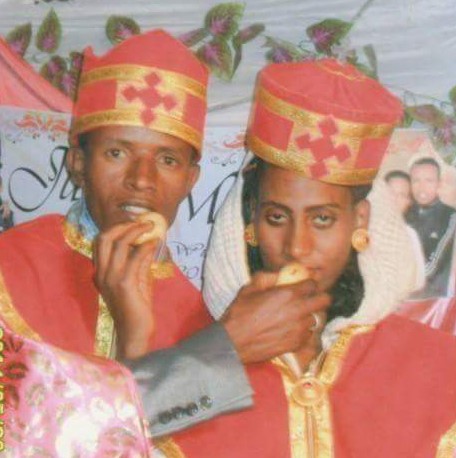
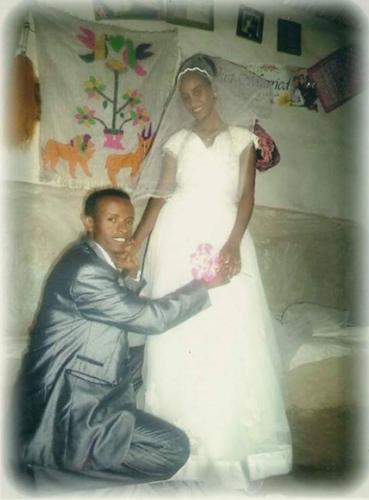
Photos from the couple's engagement period and marriage (2012-2015)
“Sometimes I watch the video again just to remember how it once was”, says Misghinna.
Because reality has turned out to be very different than what the young pair had expected. After just a few months, the Eritrean government decided that all teachers should be sent to military training camps. After this, Misghinna was supposed to teach at a military school many hours journey away from his hometown.
”The government can do what they like. You can’t say no. If you don’t go along with them, you’re arrested and imprisoned. Maybe you never get released. I had completed national service once already. But that made no difference. When I went to high school, I was in jail for six months. In my country, everyone has to take their final year at a special military high school, where everything is controlled by the government. The government didn’t like the fact I had gathered others to read the bible in my role as deacon. They thought that we were preparing an escape attempt. That I managed to take the final exam is a wonder of God. If I hadn’t passed, I’d have been a soldier the rest of my life.”
Fled during the night
When Misghinna was summoned for the second time, he was teaching at a high school close to the Ethiopian border. He decided to flee, together with one of his colleagues.
”We fled on foot over the mountains during the night. It was very dangerous. We went carefully and were constantly ready to run if we were discovered. The border area was filled with soldiers. We were lucky. After six hours, we were in Ethiopia.”
At that time, Selam was pregnant with the couple’s first child, so she couldn’t follow Misghinna. The plan was that once he had made it to a safe country, he would organize that she could follow him.
”In Ethiopia, we were sent to a camp for refugees. I decided to continue on foot through the desert to Sudan together with six others. We had no compass but used the sun and stars. We walked for 10 days. It’s a miracle that we made it to our destination. We could just as easily have ended up in the wrong country.”
Lost a friend in the desert
Misghinna is silent for a moment before he continues his account of the journey through the desert to Libya.
”We were packed together onto small Toyota pick-ups. There were 29 in my car. The journey took a week. In the desert, I lost my best friend. He didn’t make it. I still think a lot about my friend. It’s difficult to talk about. There’s no humanity in the desert. Anyone who tried to help those who fell from the cars were beaten by the Libyans”.
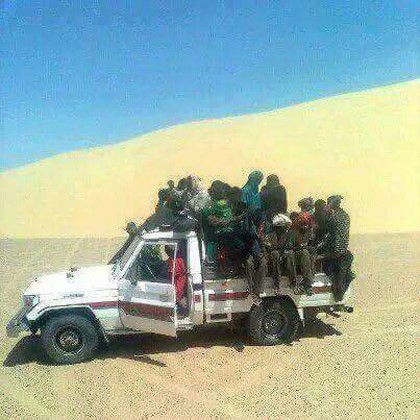
Human smuggling in Libya (unknown photographer)
”I waited for two months in Libya. At that time, we were 600 people in a warehouse. There wasn’t enough food and water. I tried to share what I had with women and children. We heard shots every night. When they others saw me read the bible, they asked me to pray to God to help us all. The following days, I continued to sing, pray and read aloud from the bible. When I sang, it seemed to help people be calm”.
He tells about his first attempt to cross the Mediterranean.
”There were 650 of us in the boat. I sang very loudly and prayed while we sailed. If people panicked, the boat could sink. But after seven hours, we were spotted by the Libyans and forced back to Libya. Everyone was very scared. We didn’t know what was going to happen”.
”After two weeks the smugglers sent us off again. We sailed for seven hours. Luckily, it was the Italian coast guard who found us this time. They told us that they had rescued 1,000 people that day. In the harbour in Italy, we thanked God for the fact that we were alive. I can’t describe it. It was very overwhelming”.
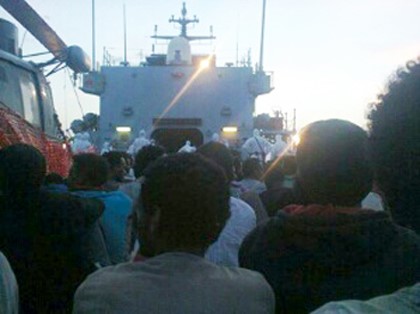
Refugees rescued by Italian coast guard (private photo)
To Samsø
From Italy, Misghinna travelled onwards up through Europe. He came to Denmark on the 12th September 2015.
”I didn’t know anyone here and came straight to the camp at Sandholm. After a few weeks, a group of 12 of us from Eritrea were transferred to Samsø. Every evening, I gathered the others for evening prayers in a room at the asylum centre. At that time, I was so extremely happy and grateful to be alive. While I was on Samsø, my wife gave birth to our son. Everyone was so happy”, tells Misghinna, who received asylum after just three months – unusually quickly.
Rejected application for family reunification
In December, Misghinna started a new life in Lille Skensved near Køge. But shortly afterwards, his new-born son in Eritrea became sick and died.
”I never saw my son. I only saw photographs. My heart is still broken”.
“In February 2016, I had an application for family reunification for my wife ready to submit. But after nearly two years of waiting, I was rejected because our marriage was only registered in the church. I’m grateful that Denmark has taken me in but I can’t live here without my wife. I’ve made a big effort to become integrated. I want to be a resource for Danish society. I only received integration benefits for seven months and have provided for myself the rest of the time”, explains Misghinna, who has a full-time job as a postal assistant and has also worked as an interpreter.
”I work at night. It’s hard but I can take it. I really need to earn money. Every month I send money to my wife. I am all she has”.
When Misghinna was granted asylum, he was lodged in a temporary residence at a disused farm. Two and a half years later, he’s still living there. Five Eritreans share a kitchen and bathroom.
”People in town are very polite and helpful and say hello to us. But it’s really hard to find an apartment. I’ve appealed the decision on family reunification and really hope that I’ll get a positive answer soon. When my wife comes, we’ll need our own apartment”.
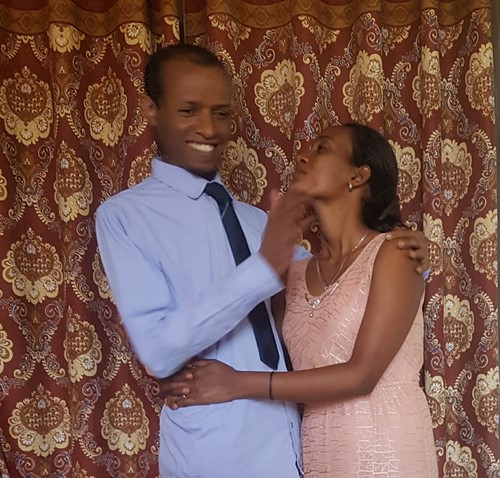
Misghinna visits Selam in Ethiopia in January 2018, reunion after almost 3 years
Many dreams
On Sundays, Misghinna takes the train to Copenhagen to take part in Mass with the Eritrean congregation at Mariakirken in Vesterbro. As deacon, he sometimes helps the church’s priests.
”I learned a fondness for the Church’s songs and liturgies at an early age. My grandfather was a priest and visiting priests would often stay with us. My mother had a strong faith and wanted me to become a deacon but my father would rather have that I got a decent education. I was ordained as a deacon when I was 16. Maybe I’ll become a priest someday. Being a priest is a great responsibility. You shouldn’t be too young. But when I serve God in the church, I feel that I’m where I’m supposed to be. It brings me great joy”.
”I still have many dreams. Although I’m very worried about my wife, God gives me hope. I want to give that hope on to other Eritreans here in Denmark. If you don’t have hope, you can’t integrate yourself into a new society”.
In January, Misghinna visited his wife in Addis Abeba, Ethiopia. They hadn’t seen each other for over two years. She had left Eritrea illegally, which is the only way out – and which makes it punishable for her to return. The medieval and inhumane conditions at Eritrea’s prisons are infamous.
“It was both really good and really hard. We’re now expecting our second child. I pray that we can get family reunification before my wife has to give birth. Sometimes it’s difficult to keep a handle on my thoughts. But I try just to focus on the present day. Tomorrow belongs to God”.
As a member of Refugees Welcome, you make sure that we can file complaints for Misghinna and many others


